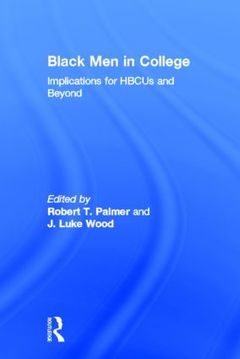Description
Black Men in College
Implications for HBCUs and Beyond
Coordinators: Palmer Robert T., Wood J. Luke
Language: English
Subject for Black Men in College:
Keywords
HBCUs; masculinity; Black Males; historically; Black Man; colleges; Young Men; universities; Grade Point Average; man; GPA; male; Postsecondary Education; students; Black Male Students; predominantly; Stem Major; white; Black Male Student Athletes; institutions; HBCU Campus; PWI Counterpart; Black Greek Letter Organizations; PWIs; Black Male Collegians; Black Male College Students; Morgan State University; Fi Ve; Black Male Experience; Black Gay Men; Low Income Black Men; Academically Underprepared; HBCU Faculty; Tinto’s Theory; Student Engagement
Publication date: 01-2012
Support: Print on demand
Publication date: 01-2012
224 p. · 15.2x22.9 cm · Paperback
Description
/li>Contents
/li>Readership
/li>Biography
/li>
Black Men in College provides vital information about how to effectively support, retain, and graduate Black male undergraduates. This edited collection centers on the notion that Black male collegians are not a homogenous group; rather, they are representative of rarely acknowledged differences that exist among them. This valuable text suggests that understanding these differences is critical to making true in-roads in serving Black men. Chapter contributors describe the diverse challenges Black men in HBCUs face and discuss how to support and retain high-achieving men, gay men, academically unprepared men, low-income men, men in STEM, American immigrants, millennials, collegiate fathers, those affiliated with Greek organizations, and athletes. Recommendations for policy and practice to encourage retention and persistence to degree completion are grounded in extant theory and research. This text is a must-read for all higher education faculty, researchers, and student affairs practitioners interested in addressing the contemporary college experiences of Black men in postsecondary institutions.
Foreword: A Note from Michael J. Cuyjet, University of Louisville
Acknowledgements
1. Setting the Foundation for Black Men in Colleges: Implications for HBCUs and Beyond , Robert T. Palmer, SUNY Binghamton, J. Luke Wood, San Diego State University
2. High Achieving Black Men at HBCU’s, Marybeth Gasman, University of Pennsylvania, Dorsey Spencer Jr. Bucknell University of Pennsylvania
3. Coming Out of the Dark: Black Gay Men’s Experiences at Historically Black Colleges and Universities, Terrell L. Strayhorn, The Ohio State University, Jameel A. Scott, University of Maryland at College Park
4. "Yes, I can!" Strengths-based Approaches for Engaging and Empowering Academically Underprepared Black Men, Tiffany P. Fountaine, Morgan State University, Joelle Carter, George Washington University
5. "Reaching Out to My Brothers": A Critical Review of Literature to Improve the Retention of Low-Income Black Men at HBCUs, Jameel A. Scott, University of Maryland, College Park
6. Establishing Critical Relationships: How Black Males Persist in Physics at HBCUs, Sharon Fries-Britt, University of Maryland, College Park, Brian A. Burt, University of Michigan, Khadish Franklin, University of Maryland, College Park
7.Bicultural Experiences of Second Generation Black American Males, Lorenzo DuBois Baber, University of Illinois, Urbana-Champaign
8. Standing in the Intersection: Black, Male, Millennial College Students, Fred A. Bonner, II, Texas A& M University
9. Black Fathers in College: Multiple Identities, Persistence and Contextual Differences, T. Elon Dancy II, University of Oklahoma, Gralon A. Johnson, Northwestern University
10. Black Men, Fraternities, and Historically Black Colleges and Universities, Dorian L. McCoy, University of Vermont
11. "Man-to-Man": An Exploratory Study of Coaches’ Impact on Black Male Student-Athlete Success at HBCUs, David Horton Jr., Ohio University
12. Academically Gifted Black Male Undergraduates in Engineering: Perceptions of Factors Contributing to their Success in an Historically Black College and University, Alonzo M. Flowers, Texas A&M University
13. Innovative Initiatives and Recommendations for Practice and Future Research: Enhancing the Status of Black Men at HBCUs and Beyond, J. Luke Wood, San Diego State University, Robert T. Palmer, SUNY Binghamton
About the Contributors
Robert T. Palmer is Assistant Professor of Student Affairs Administration at The State University of New York–Binghamton.
J. Luke Wood is Assistant Professor of Administration, Rehabilitation, and Post-Secondary Education at San Diego State University.




